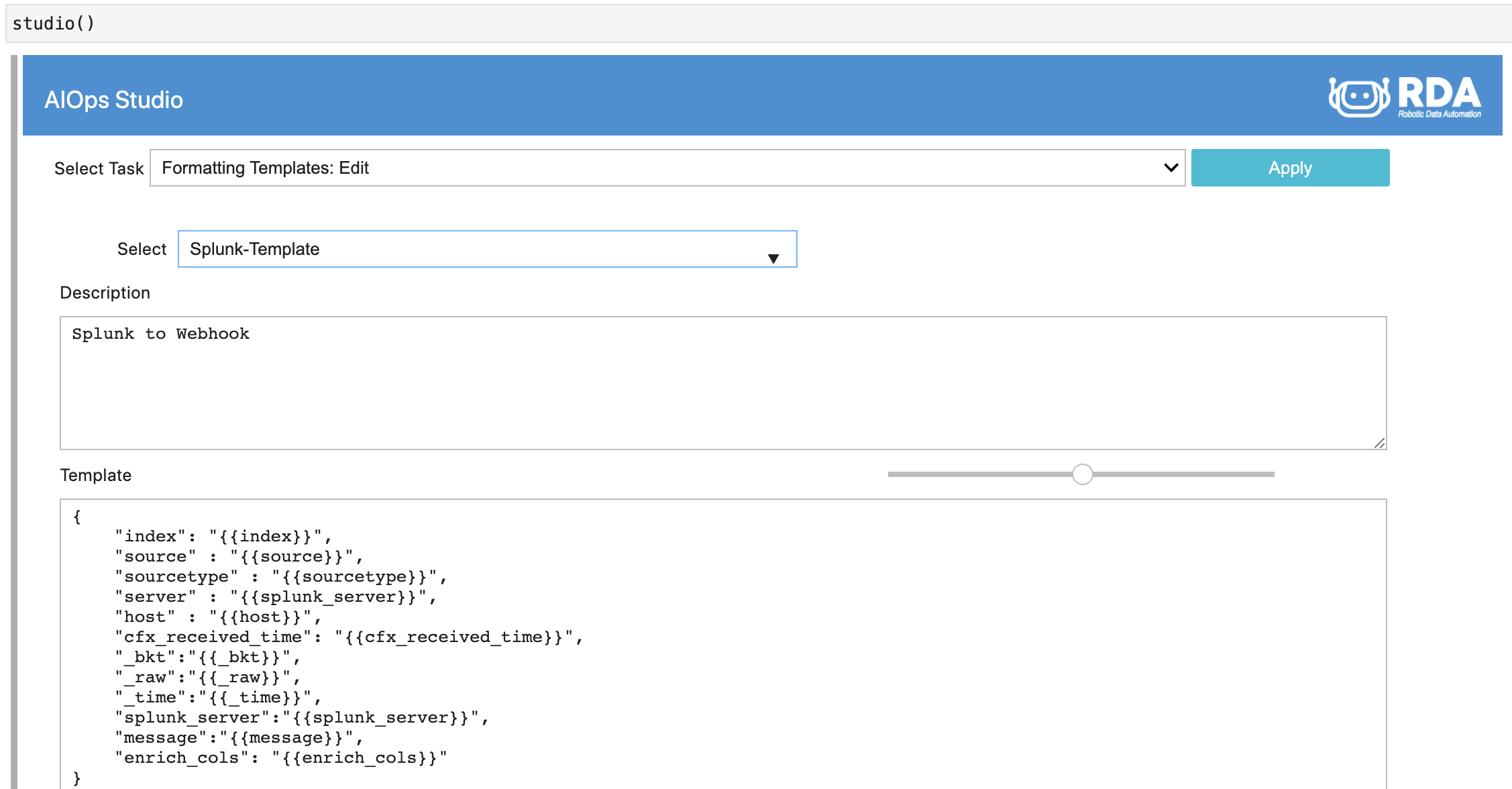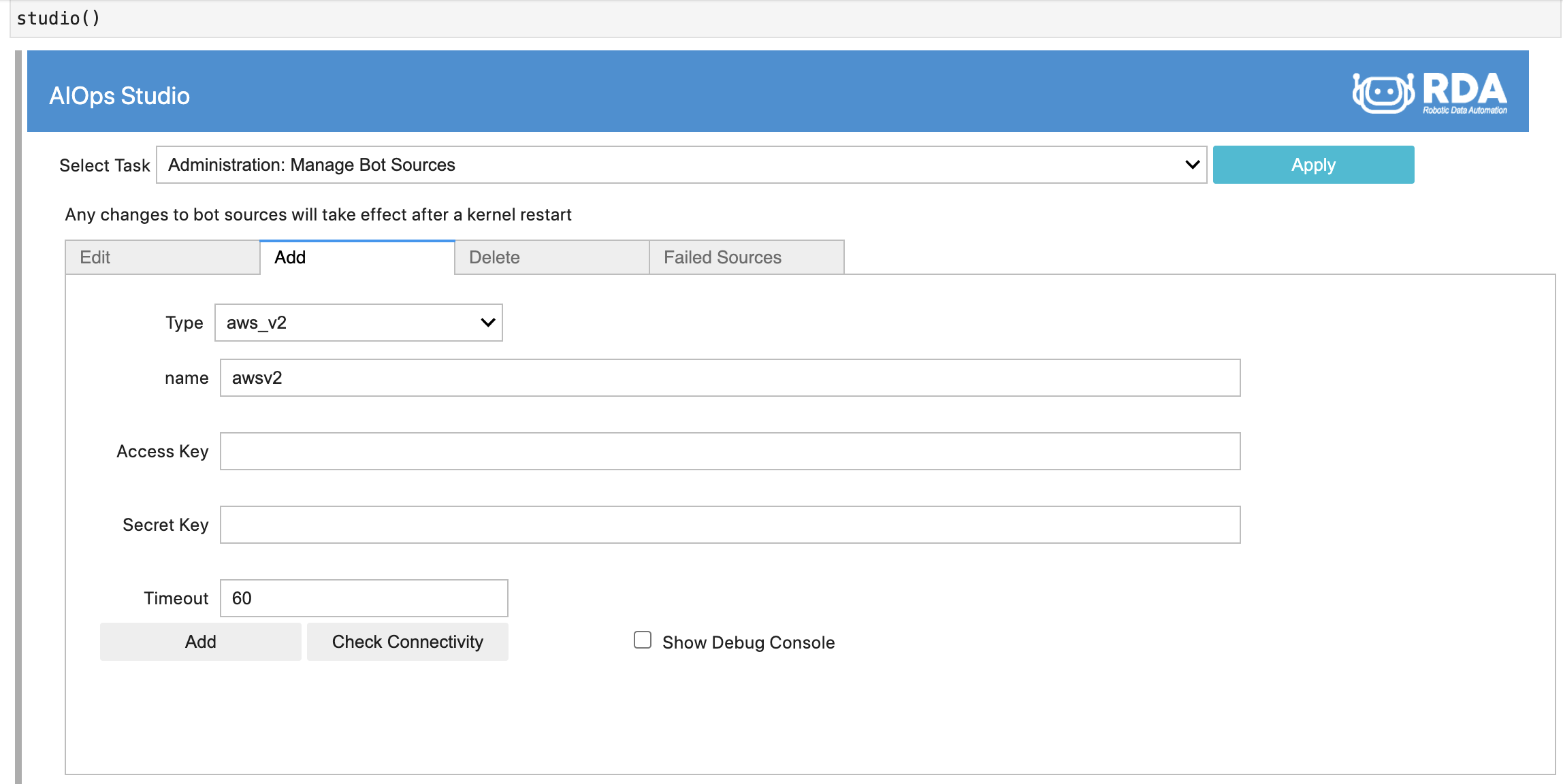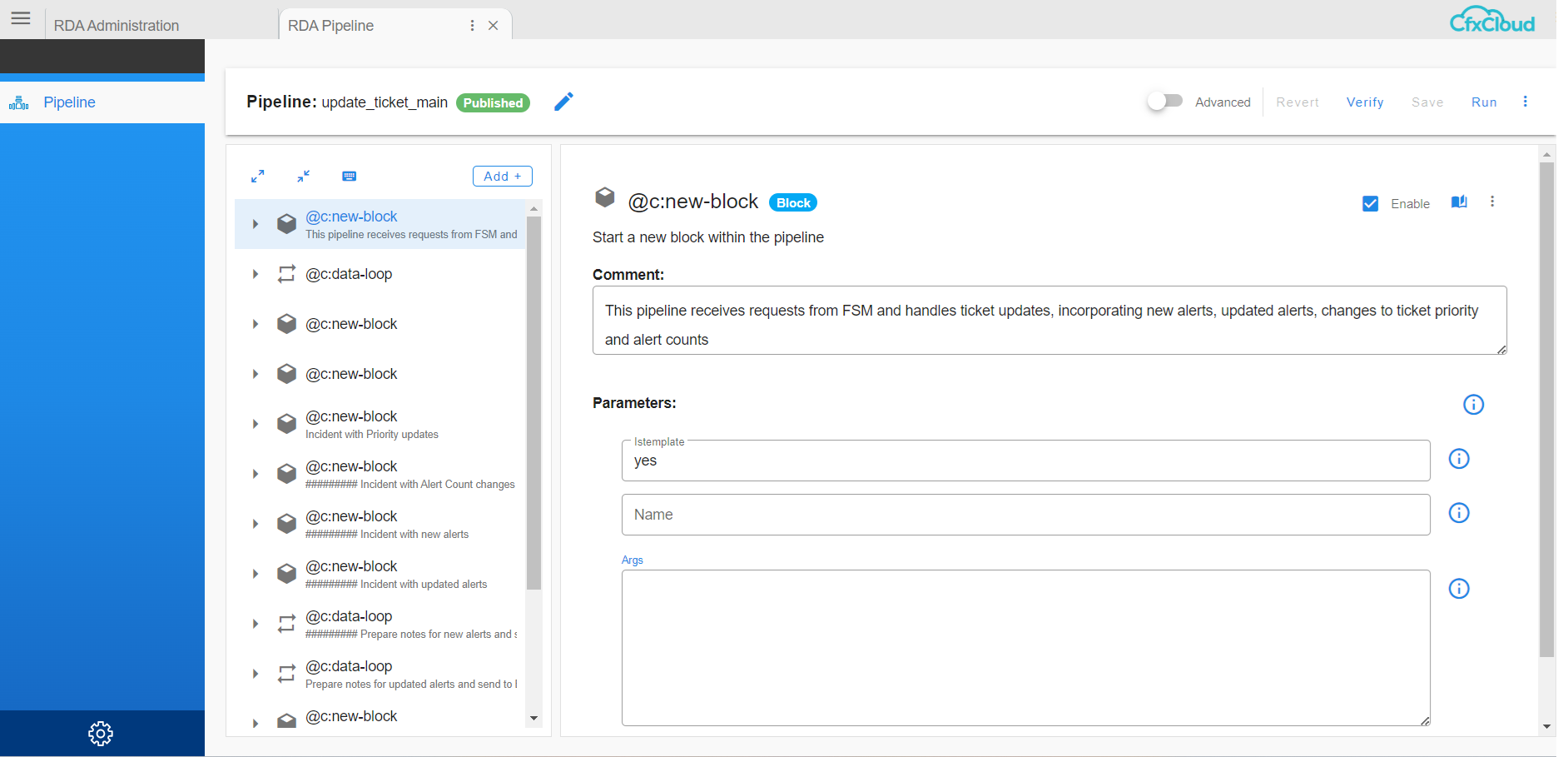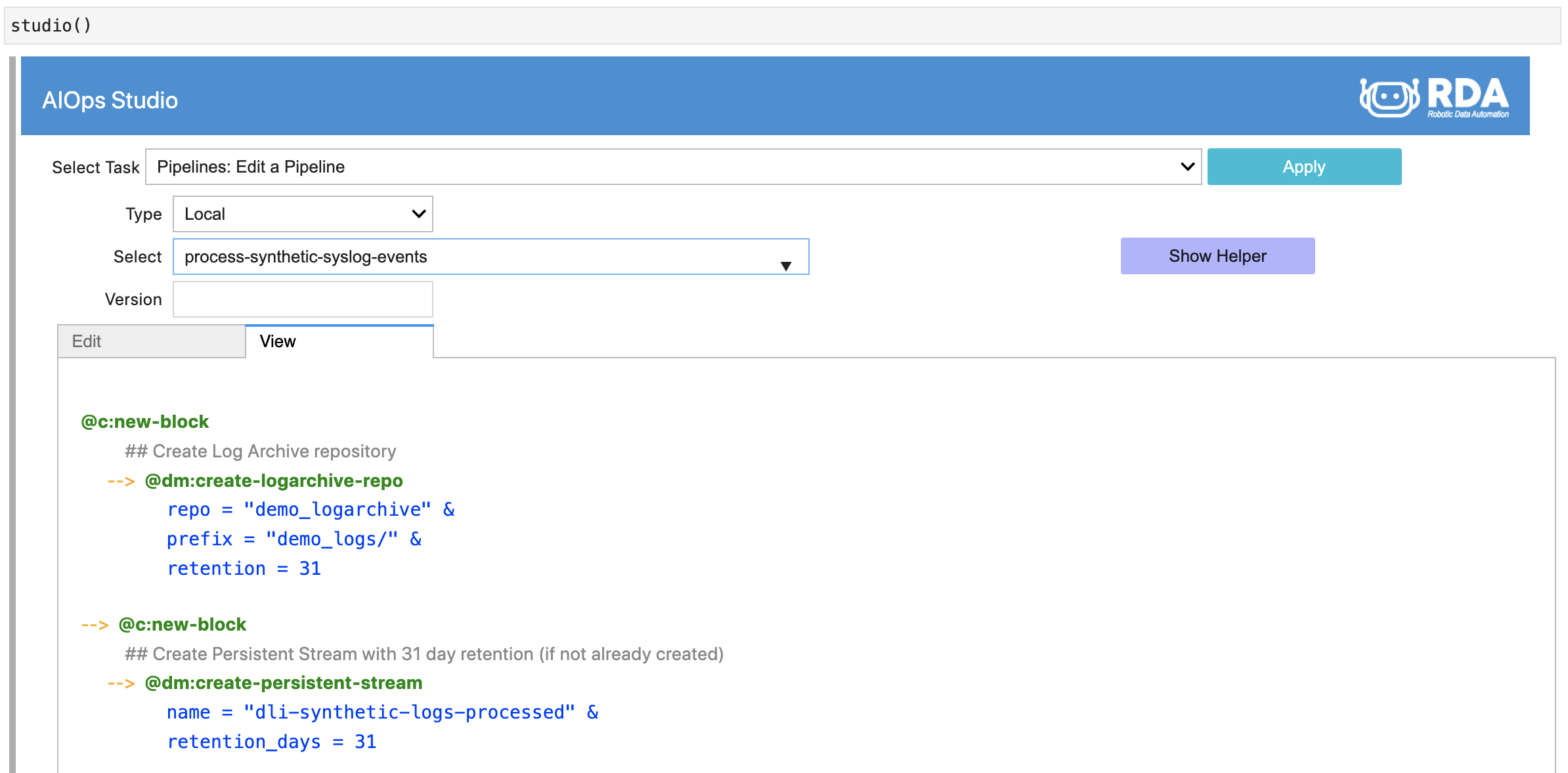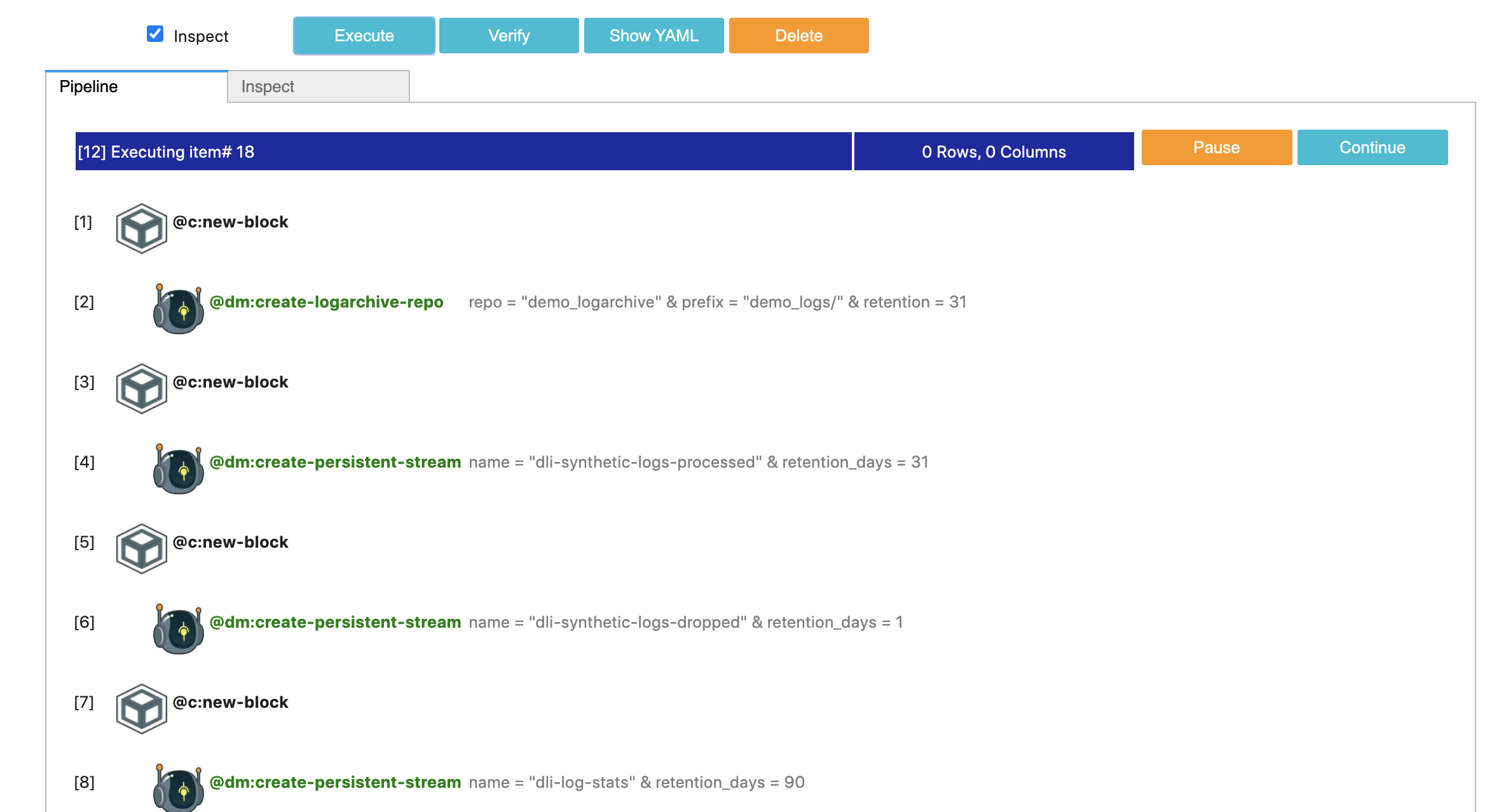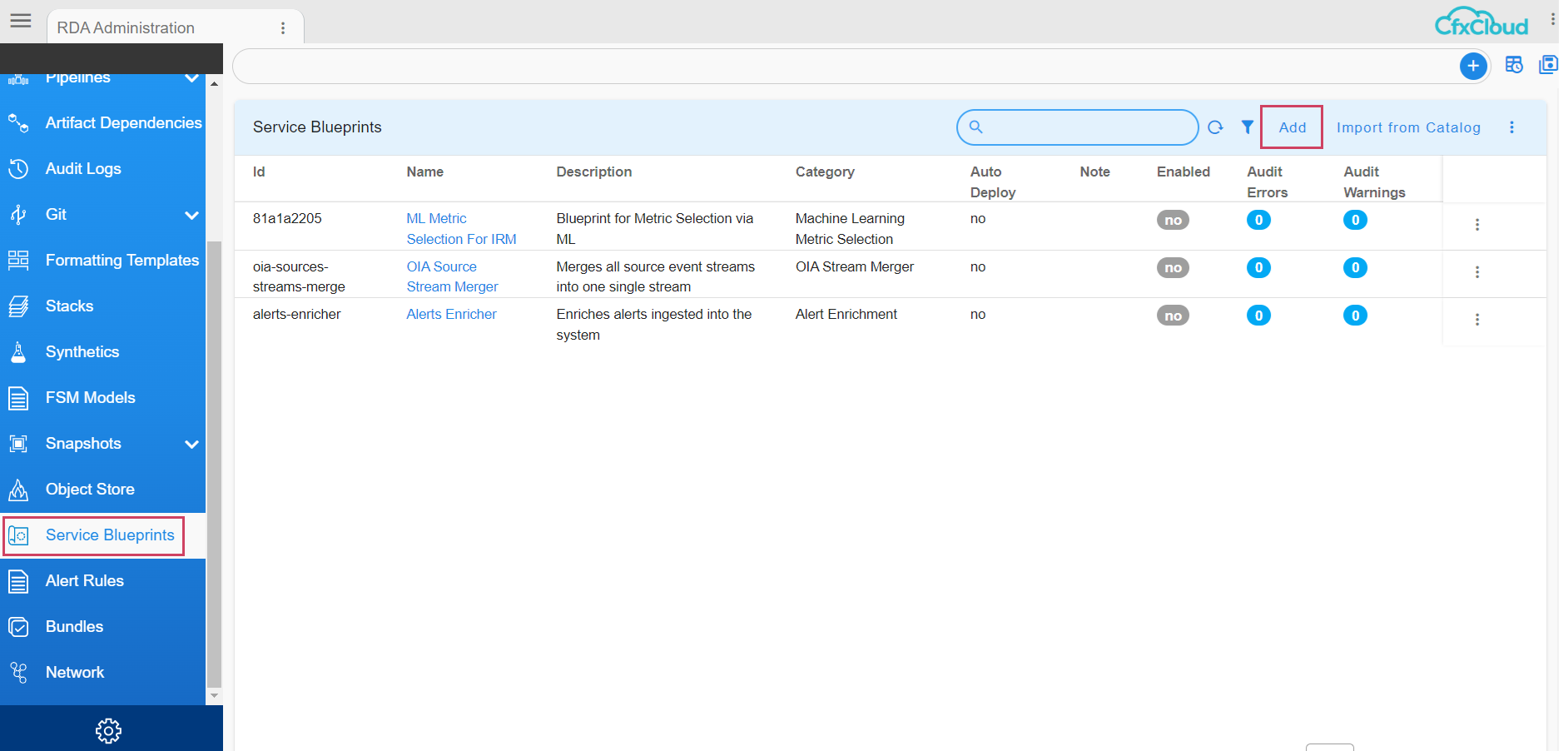Artifacts to Control Data in RDA Fabric
| Artifact Type | Description |
|---|---|
| Formatting Templates | RDAF uses Jinja2 Templating Engine to format data. |
| Credentials | Credentials to various systems / integrations are stored securely in RDA Fabric Vault |
| Bookmarks | RDA Fabric uses Bookmarks as a way to remember how far each data stream has been read. |
| Pipelines | Pipelines are low code lines of text to manage data. |
| Service Blueprints | Service Blueprints help manage lifecycle of one more pipelines, and related artifacts, collectively as a single service. |
1. Formatting Templates
RDAF uses Jinja2 Templating Engine to format data to make it suitable for REST Endpoints, HTML Reports sent via email, and many other formats as needed by various integration endpoints.
Storage Location
RDAF Object Storage
Related Bots
Related RDA Client CLI Commands
Formatting Templates management commands
Following are valid sub-commands for fmt-template:
list List Formatting Templates
get Get Formatting Template
delete Delete Formatting Template
Managing through RDA Portal
- In RDA Portal, Click Home Menu -> Configuration -> Rda Administration -> Formatting Templates
Managing through RDA Studio
- Both RDA Studio & RDA Fabric share this artifact
- In RDA Studio, Select Task 'Formatting Templates: Edit'
Examples
2. Credentials
Credentials to various systems / integrations are stored securely in RDA Fabric Vault, encrypted using Fernet that uses 256 bit key. RDAF also uses a unique salt for each encryption.
Storage Location
- In RDA Fabric / RDA Portal: RDAF Object Storage
- In Studio: Stores locally inside container or on mounted volume.
- RDA Fabric & Studio DO NOT share credentials. Each one must be configured separately.
Related RDA Client CLI Commands
Credentials (Secrets) management commands
Following are valid sub-commands for secret:
types List of all available secret types
add Add a new secret to the vault
delete Delete a secret from the vault
list List names and types of all secrets in vault
See RDA CLI Guide for installation instructions
Managing through RDA Portal
- In RDA Portal, Click Home Menu -> Configuration -> Rda Integrations -> Credentials
Managing through RDA Studio
- RDA Studio & RDA Fabric DO NOT share this artifact
- In RDA Studio, Select Task 'Administration: Manage Bot Sources'
3. Bookmarks
RDA Fabric uses Bookmarks as a way to remember how far each data stream has been read. It ensures that future data polls / pulls continue with rest of the data after the bookmarked point. Bookmarks typically stores timestamps or document IDs. Bookmarks are only managed via bots.
Storage Location
RDAF Object Storage
Related Bots
- @c:bookmark-loop
- @dm:bookmark-list
- @dm:load-bookmark
- @dm:save-bookmark
- @dm:query-persistent-stream-from-bookmark
4. Pipelines
In RDA, Pipelines are low code lines of text to manage data. Each pipeline is usually built using a series of Bots and Parameters to control the behavior of that bot.
Storage Location * In RDA Fabric / RDA Portal: RDAF Object Storage * In Studio: Stores locally inside docker container or on a mounted volume. * RDA Fabric & Studio DO NOT share pipelines. Using RDA Studio, Pipelines can be published to push pipelines to RDA Fabric.
Related Bots
- @exec:run-pipeline
- @exec:run-pipeline-by-row
- @exec:run-pipeline-multi-proc
- @exec:run-pipeline-by-row-multi-proc
Related RDA Client CLI Commands
pipeline-delete Delete pipeline by name and version
pipeline-get Get pipeline by name and version
pipeline-get-versions Get versions for the pipeline
pipeline-list List published pipelines
pipeline-publish Publish the pipeline on a worker pod
pipeline-published-run Run a published pipeline on a worker pod
pipeline-convert-to-json Convert all pipelines in folder from yaml to json
run Run a pipeline on a worker pod
run-get-output Run a pipeline on a worker pod, wait for completion and get output
watch-logs Start watching logs produced by the pipelines
watch-traces Start watching traces produced by the pipelines
See RDA CLI Guide for installation instructions
Managing through RDA Portal
-
Go to Home Menu -> Click Configuration -> Rda Administration -> Click Pipelines -> Published Pipelines
-
Typically pipelines are developed, debugged & verified in RDA Studio and then published to RDA Fabric for execution.
-
Following is an example view of RDA Pipeline Builder.
Managing through RDA Studio
- RDA Studio & RDA Fabric DO NOT share this artifact
- In RDA Studio, Select Task 'Pipelines: Add a New Pipeline' or 'Pipelines: Edit a Pipeline'
Examples
5. Service Blueprints
Service Blueprints help manage life cycle of one more pipelines, and related artifacts, collectively as a single service.
Service Blueprints are created in YAML format.
Storage Location
- In RDA Fabric / RDA Portal: RDAF Object Storage
- Not supported in RDA Studio.
Related RDA Client CLI Commands
deployment-activity List recent deployment activities
deployment-add Add a new Deployment to the repository.
Deployment specification must be in valid YML format
deployment-audit-report Display Audit report for a given deployment ID
deployment-delete Delete an existing deployment from repository
deployment-dependencies List all artifact dependencies used by the deployment
deployment-disable Disable an existing deployment if it is not already disabled
deployment-enable Enable an existing deployment if it is not already enabled
deployment-map Print service map information in JSON format for the given deployment
deployment-status Display status of all deployments
deployment-svcs-status List current status of all service pipelines in a deployment
See RDA CLI Guide for installation instructions
Note: The term
deploymentin CLI commands refers to Service Blueprints.
Managing through RDA Portal
-
Go to Home Menu -> Click Configuration -> Rda Administration -> Service Blueprints -> Add
-
cfxCloud offers a set of pre-built Service Blueprints. In Home screen, Click
Add +action next to Services, to import pre-built blueprints.
Managing through RDA Studio
- Not supported
Examples
See Beginner's Guide: Deploying service blueprint in RDA Portal for an example.

